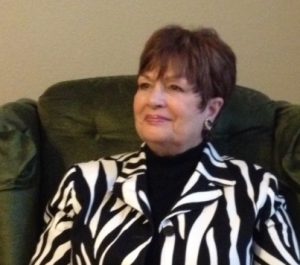CONGRATULATIONS!
The Distinguished Humanities Educator Award is bestowed biennially at the CCHA Divisional Conferences (even years). If you would like to nominate someone for this prestigious award, you can do so by contacting your divisional leadership by selecting your division here.
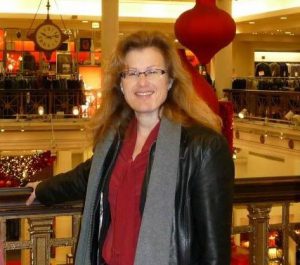
Central Division: Amy Forss
Metropolitan Community College
Dr. Amy Helene Forss currently serves as the History program chair and the co-chair of the Social Sciences department at Metropolitan Community College in Omaha, Nebraska. She has a PhD in African American History from the University of Nebraska-Lincoln. Her first book, Black Print with a White Carnation: Mildred Brown and the Omaha Star Newspaper, 1938-1989, was published by the University of Nebraska Press in 2013. She is in the process of having a children’s picture book version of it published and is researching/writing her third book, Borrowing from our Foremothers, a comparison between suffragist and modern feminist strategies. Amy enjoys her family, exercising, and traveling.

Central Division: Amy Clark Knapp
Clark State Community College
I was born, raised, and currently reside in the small town of Springfield, Ohio. I have two wonderful kids who acquired their degrees, but left Springfield for the “land of opportunity”—Los Angeles.
At a young age, I became interested in art—as I grew, I wanted to know where it came from and what it meant. As a young adult, I found myself in a World Classics program. Little did I know at the time that that program required me to study virtually everything under that giant umbrella called, “humanities.” (Which means I’ll be a student until I take leave of this planet!) However, that program created a love of learning and teaching, and generated an undying love and passion for antiquities.
I began teaching Art History and Appreciation of the Arts at Clark State Community College in 2007; within a few years I was also teaching Western Civilization and American History. Still, my heart was in antiquity.
In 2012, I took part in the CCHA/NEH Seminar Etruscans and the Early Roman City. For me, that experience brought the Etruscans to life. Since that time, that ancient culture has been like family, engulfing both academic research and casual conversations. After the seminar, I persisted in the research of Etruscan symbolism and iconography. In 2015, I was awarded the CCHA Affiliated Fellowship at the American Academy in Rome, where I was able to examine artifacts and polish my research.
Currently, when I’m not teaching, sewing, writing, or gardening, I’m lost in history; and chances are, I’m pursuing the Etruscans.
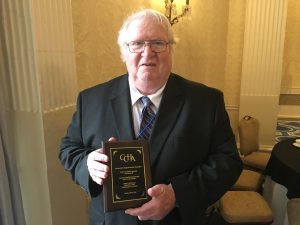
Eastern Division: John “Jack” Lawlor
Reading Area Community College (emeritus)
John M. Lawlor, Jr. taught part-time at Reading Area Community College (RACC) from 1976 until 1990. During those years, he worked full-time with the Reading Railroad and for ten years as a shop systems specialist with AT&T micro-electronics integrated circuits doing engineering and systems’ implementation work. He took a full time position at RACC in 1990 and retired on December 31, 2015 with emeritus status
While at RACC, he served as professor of history, division chair and director of instructional technology. He secured over $500,000 in grants for the college. Among the grants’ activities were the development and implementation of the Humanities Multimedia Lecture Hall, the Social Sciences Discovery Lab, and the CAPE videoconferencing classroom. Other grants supported faculty development in universal curriculum design, local history projects especially digitization of the Schuylkill Navigation System maps.
Supporting student scholarship, he mentored 23 students as finalists in the Beacon Competition and sponsored many student papers for publication in Legacy, the CCHA recognized RACC student journal. He supported dozens of students in successful pursuit of local, state, and national scholarship awards. In the course of his career, he escorted over two hundred students to the National Archives for research or special events. He serves as judge and mentor for National History Day.
In 1999 the National Archives selected him as Constitutional Community member to design digital American history lesson plans. The lessons cover four periods of American history and are still very active at http://www.Archives.gov .
Two “Landmark” sessions were very productive for him. Working with David Leight, a friend and colleague, they developed digital instructional materials at the Hayes Presidential Center’s (HPC) “Progress and Poverty Gilded Age Landmark.” HPC published our work at their website. These materials consist of letters, reports, photographs, illustrations and other primary source documents relating to Hayes, Twain, Howells, Willard, DuBois, and other notables of the era. Further, they integrated the materials into a blended history/literature course that we volunteered to teach, co-presented at several conferences on several topics, and published our findings. At the Concord “Landmark” on the Transcendentalists, John attended a session by Pulitzer Prize winning author John Matteson (Eve’s Eden) in the Concord School of Philosophy.
As fellow and mentor at the Community College Humanities Association/NEH/Library of Congress American Cities/Public Spaces Institutes, he researched “Progressive Era safety in public places” and the “Arts in the temperance movement” topics. CCHA published both papers in the Journal of the Community College Humanities Association. The Library of Congress posted the temperance project as a webcast on their website. The Pennsylvania Humanities Council named him “Commonwealth Speaker” for this project in 2008. In 2015 and 2016 he served as mentor for the CCHA/NEH/Library of Congress/National Archives/Smithsonian Institution On Native Ground summer institute.
John served as consultant on Dr. Laurie Grobman’s Central Pennsylvania African American Museum (CPAAM) – Pennsylvania State University (Berks Campus) Civil Rights oral history project, CPAAM recognized him in 2016 for its community service “Making a Difference” award. He continues to support CPAAM initiatives and projects.
His current activities include volunteering as a consultant for the Education Department at the National Archives, frequently working in the Boeing Education Center, and continuation of the Veterans History Project at RACC in conjunction with the Library of Congress American Folk Life Center. He is digital video editing the Amending America Conversations #RightsAndJustice at the National Archives. In addition, he contributes to the lobbying efforts of the National Humanities Alliance. Finally, he continues to be active with researching, writing and disseminating project outcomes at conferences and through publishing.
John lives in Womelsdorf, PA with his wife, Michele. He has two children, John and Alicia, and three grandchildren, Maverick, Mattias, and Josie.
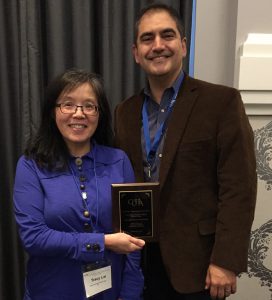
Pacific-Northwestern Division:
Tracy Lai
Seattle Central College
From her nomination letter:
“Tracy Lai, a member of the CCHA, inspires her colleagues and students through her indefatigable academic and community efforts. As an Instructor of History, Women Studies, and American Ethnic Studies she has been a powerful force for almost 30 years within the movement to integrate pedagogy and research about culture to social justice efforts in community colleges. Tracy ’s formidable drive to teach and write about cultures, power, and the poetics of politics are enacted in a myriad of venues. Whether in front of the classroom or a publication, at a conference or community event, Tracy has steadfastly made interventions that illuminate how aggrieved communities have resisted and thrived.”
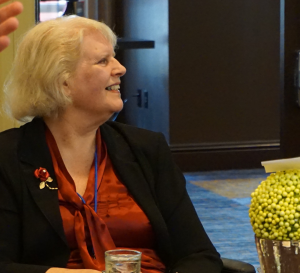
Southern Division: Barbara Tucker
Trident Technical College
Dr. Barbara Tucker’s career has been marked by a lifelong commitment to the humanities. Earning a doctorate in multidisciplinary studies, her work at Trident Technical College and in the broader Charleston community focused on bringing together disparate perspectives and academic voices from the fields of art history, philosophy, literature, and history. A driving force in TTC’s NEH Bridging Cultures grant, she helped open up discourse, and travel, between the Lowcountry and West Africa to foster our knowledge and connection to Gullah culture ongoing. She served as a Trident Tech. instructor for 20 plus years, while also serving as the head of the History, Humanities, and Political Science Department from 2008-2016.
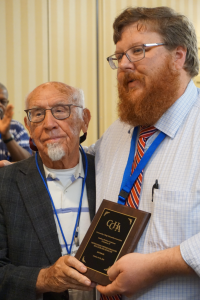
Southern Division: Joe Engel
Lifetime Humanities Advocate Awardee
Joe Engel is a native of Poland, who now lives in Charleston, Engel was among millions tortured and beaten at Auschwitz. Under Nazi rule in Germany, his parents and eight siblings were all split between forced labor camps and death camps, Engel recalls with little to no food or water. “Nobody came back,” he said. “I saw a lot of my friends die.“ In 1945, while only a teenager, Engel escaped after jumping from a train going more than 55 miles an hour. It was during the death march, where prisoners marched to trains carrying them even further into Germany. Many were killed on the spot if they couldn’t keep up. For hours, he buried himself in the snow, before hiding in a manhole several more days. Years later, he learned that three of his eight siblings also survived, but never heard from or saw his parents again.
Engel now uses his story to inspire and teach the next generation. He’s traveled the country speaking to students, churches, and national leaders. “The young people should not forget what happened 70 years ago,” he said.
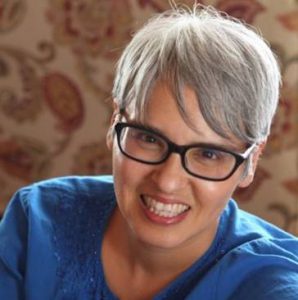
Southwestern Division: Rebecca Balcárcel
Tarrant County College
Rebecca Balcárcel took her MFA in Creative Writing and Literature at Bennington Writing Seminars and received their Jane Kenyon Poetry Prize. Her poems and essays have appeared in journals such as Third Coast and North American Review. Pecan Grove Press of St. Mary’s University published her book of poems, Palabras in Each Fist, in 2010. She serves the students of Tarrant County College as Associate Professor of English. Her debut novel Quijana is due out from Chronicle Books in spring 2019. Visit Professor Balcárcel at her website: https://rebeccabalcarcel.com/.
Random fun stuff!
- Rebecca biked 1300 miles in from Houston to Santa Fe one April back in her twenties — while pregnant! Oklahoma Review published her essay “Knots, Map, Water, Oranges.” Get your own copy by joining her email list: I want to keep up with Rebecca.
- She is the mother of identical twins and their big brother.
- She loves Anne of Green Gablesand made a pilgrimage to Prince Edward Island to see the places that inspired the books. She also met the real Winnie the Pooh at NYC’s public library in 2017.
- Rebecca went skydiving!
